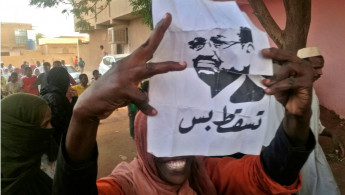Sudan's prime minister forms new cabinet as protesters boycott work, business
Sudanese across the country on Wednesday also participated in a "civil disobedience" strike called for by the signatories of the Freedom and Change Declaration, a petition requesting President Omar al-Bashir's resignation.
"We recognise the main issues, the issues of bread and oil, that need to be solved," said Mohamed Tahir Eila, AFP reported.
Eila was appointed as premier last month after Bashir dissolved the previous federal government.
The cutting of government subsidies in December sparked the first of many protests in Atbara, where demonstrators complained of the tripled cost of bread.
Bashir on February 22 dissolved the former cabinet along with all provincial governments, where he replaced governors with military generals, as he imposed a nationwide state of emergency in an attempt to end the popular movement of dissent which has dogged his rule since mid-December.
Eila's cabinet, which includes 22 ministers and 18 ministers of state, is the third formed in less than two years, with the earlier two administrations sacked by Bashir for failing to revive Sudan's economy, which has been in severe decline for almost a decade.
Several in the new cabinet had already been ministers and had been reshuffled, while others were new appointees.
Defense Minister Awad Ibn Auf was already appointed by Bashir last month, and Foreign Minister Dardari Mohammad Ahmed kept his role.
The appointments reportedly prompted anger among both regime loyalists and opponents.
"The economic issues need to be solved immediately as it impacts inflation and our currency rate," said Eila.
Soaring inflation and a shortage of foreign currency are among the economic complaints of many Sudanese. Fuel shortages and unaffordable fuel prices have also spread across the country.
While some analysts blame the country's economic crisis on the secession of oil-rich South Sudan and the imposition of International Monetary Fund (IMF) measures, many Sudanese protesters argue that endemic corruption, economic mismanagement and an excess of military spending is to blame.
Sudanese opposition organisations and protesters say they are fighting for more than just economic reform. For many, Sudan's economic decline is a mere symptom of the regime's attitude toward its citizens.
"We are protesting a corrupt government that has been exploiting Sudan's resources and people for thirty years now," Nadia, a Sudanese architect, told The New Arab last week. "The matter is much more serious than economic situation."
Civil disobedience
|
|
Sudanese across the country reportedly took part in a "civil disobedience" strike, which called for people to not go to work, businesses to not open and for civilians to vacate the streets.
Hundreds of photos distributed on social media showed empty streets across the capital Khartoum, its twin city Omdurman and the country's provinces.
"Pharmacists promised [to take part] and so they fulfilled," the Central Committee of Sudanese Pharmacists posted tweeted on Wednesday.
"Greetings to you all, you are drawing an excellent picture of the struggle!"
Another Twitter user said: "Our office is closed. Kids are home from school. Will try to get through the day without buying anything since taxes and levies fuel this government."
Social media users reported that pharmacies and shops participating in the strike were being marked in red by the authorities in Wad Madani and Khartoum.
One user claimed that pharmacies were being threatened with having their licenses revoked if they did not re-open.
Another post appeared to show "care packages" of food prepared for families who would otherwise not be able to afford to participate in the strike.
Protests against Bashir are now a daily occurence as demonstrators are in their third month of calling for the president to step down.





 Follow the Middle East's top stories in English at The New Arab on Google News
Follow the Middle East's top stories in English at The New Arab on Google News
![Israeli forces ordered bombed Gaza's Jabalia, ordering residents to leave [Getty]](/sites/default/files/styles/image_330x185/public/2176418030.jpeg?h=a5f2f23a&itok=_YGZaP1z)

